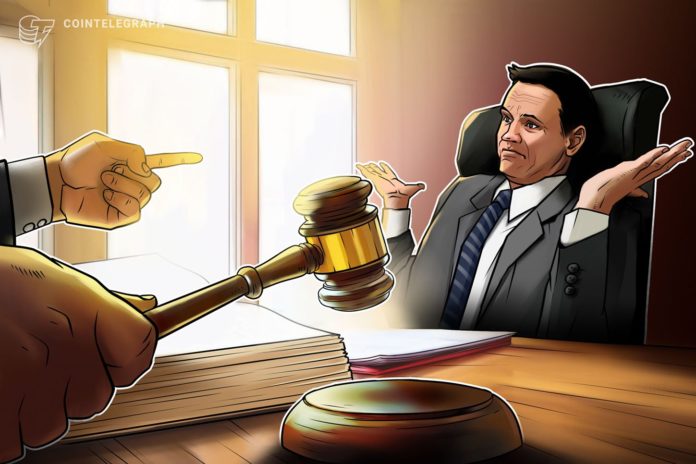[ad_1]
A recent paper from academics at Leiden Law School suggests that if a crypto exchange or crypto custodian goes bankrupt, investors could well lose control over their stored coins. This happened in Japan’s Mt. Gox exchange collapse, and more recently with the failure of Italy’s BitGrail exchange. Thus, it could happen again.
Indeed, the paper implies that even users of United States-based exchange Coinbase could have problems reclaiming their crypto in the event of insolvency — because Coinbase doesn’t segregate blockchain addresses. So, the question still stands: “Is there a risk you could lose your Bitcoin” if an exchange or custodian goes bankrupt?
“Absolutely, there is a risk,” Edgar Sargent, a partner at Susman Godfrey law firm, who was hired by CoinLab to sue Mt. Gox, told Cointelegraph. Outcomes vary depending on jurisdictions and applicable law, but the default position is that this is a debt incurred by the exchange, and in the event of the firm’s bankruptcy, a Bitcoin (BTC) investor will have to get in line with other creditors, said Sargent.
Evan Thomas, an attorney with Osler, Hoskin & Harcourt LLP, told Cointelegraph: “In the Mt. Gox case, the remaining BTC was treated as assets belonging to Mt. Gox, not assets belonging to customers. So, the BTC could be used to pay debts to Mt. Gox’s other creditors.” However, Coinbase is different from Mt. Gox, presumably because, at the very least, it’s a U.S.-regulated entity.
Moreover, in a 2019 amended user agreement, Coinbase added rules specifically concerning property rights over crypto-assets deposited with the exchange: “Title to digital currency shall at all times remain with you and shall not transfer to any company in the Coinbase Group.” But that may still not be sufficient to protect users, suggested the Leiden Law School paper, which generally explores the legal risks involved in depositing cryptocurrency with crypto-custodians, such as crypto exchanges, stating:
“Coinbase has full control over the private keys to deposited Bitcoins. It can effectively access crypto-wallets and their content. This may not only increase the risks of hacks or mismanagement, but also lead to disputes about the ownership over crypto-assets deposited with Coinbase, since control over the private key (and therefore the possibility to dispose of Bitcoins) may indicate that Coinbase is the owner of such Bitcoins or that ownership has been transferred to it. In the absence of proper segregation, allocation of cryptocurrencies to individual customers may become problematic.”
U.S.-based Gemini, another crypto custodian, by comparison, guarantees that the crypto assets in its custody accounts will be segregated from any other assets held by Gemini. “This segregation [i.e., Gemini’s] contrasts with the Coinbase contract, which does not promise to segregate customers’ crypto-assets with separate blockchain addresses, but instead allows shared blockchain addresses,” noted the paper.
Cointelegraph sought comment from Coinbase for this story, but the company did not respond before the time of publishing.
The number of bankruptcies
Crypto exchange insolvencies are not especially rare events. “Recent years have witnessed the demise of crypto-exchanges such as Cryptopia (New Zealand), QuadrigaCX (Canada), BitGrail (Italy), Cointed GmbH (Austria) and a host of other crypto-exchanges around the world. These cases reveal that the qualification of the contractual and property law rights of crypto-investors is problematic,” wrote the Leiden Law School authors.
Thomas concurred: “If an exchange/custodian goes insolvent, customers who have crypto with the exchange/custodian may get back nothing.” Depending on the terms and conditions between the user and the exchange, as well as applicable insolvency law, the crypto held with the exchange or custodian could be considered part of the insolvent exchange/custodian’s estate.
Thomas explained further by using the Einstein exchange as an example: “In other words, some of the crypto may be liquidated to pay other debts to employees, lenders, tax authorities, etc., which reduces what’s left for the customers.” Peter Watts, a law professor at the University of Auckland and a Barrister told Cointelegraph:
“If a crypto exchange goes bankrupt, investors could well lose control over their coins — or share of pooled coins — unless the legal jurisdiction governing the exchange recognizes the concept of the trust, and the rules for trusts have been met on the facts.”
The Cryptopia case
Watts represented account holders in the Cryptopia case. Cryptopia, a cryptocurrency trading exchange formed in 2014 in New Zealand, was placed into liquidation in May 2019 after suffering a serious hack and losing some $30 million worth of cryptocurrency.
As with Mt. Gox, the question arose: “Who owned the remaining cryptocurrency under the control of Cryptopia, estimated to be worth about $111 million (170 million New Zealand dollars).” The matter was brought before the High Court of New Zealand, a dispute that pitted Cryptopia’s creditors — 37 trade creditors and 90 shareholders — against an estimated 800,000 account holders with positive coin balances.
The Court ruled in April 2020 that the remaining crypto should be considered investor’s “property” and returned to those investors for whose benefit it was being held in “multiple trusts.”
As Watts explained to Cointelegraph: “For most of its life, Cryptopia Ltd. didn’t say anything express about a trust in its terms and conditions. But happily, we were able to persuade the Court that a trust could nonetheless be inferred from all the context, including the marketing documents and on-line instructions” — though it would have been much easier if the terms and conditions had expressly recognized the trust relationship. In February 2020, the Singapore Court of Appeal in Quoine Pte Ltd v. B2C2 Ltd ruled the other way in a similar case, as Watts added.
Thomas observed that the fact that crypto is considered “property” — and not something else, like currency — is all well and good, “but the more important question is the legal relationship between the customers, the custodian/exchange and the crypto.” Does the custodian/exchange own the crypto and the customers only have a contractual right to receive delivery of a specific amount of crypto? Is the custodian/exchange holding the crypto in trust for the customers? Or do the customers own the crypto and the custodian/exchange is merely a custodian, like a warehouse holding goods belonging to its customers? “Depending on the answer, the ability of customers to recover anything in an insolvency could be different.”
Related: Ball’s in Their Court: Crypto Custodians Waiting on Regulators to Act
There is no clear guidance here. “Rights of customers in insolvency proceedings ultimately depend on the applicable insolvency and property laws,” wrote the Leiden Law School authors, adding: “Determination of the applicable law is therefore critical, but complicated by a lack of harmonized private international law rules that are appropriate for the specific nature of cryptocurrencies and the relations between customers and crypto-custodians.”
The BitGrail case
Control of private keys is often an important determinant of crypto ownership, according to the paper, and without it, a court may not allow users to reclaim their Bitcoin or other cryptocurrencies in the event of insolvency. This happened in the case of BitGrail, an Italian cryptocurrency exchange, which was declared insolvent in January 2019.
“The court noted that deposited cryptocurrencies were directed towards the main address of the exchange (one single omnibus address), controlled by its founder,” noted the paper. It was impossible to establish to which customer the disappeared crypto-assets belonged, as the paper noted:
“Because of the interchangeability within the omnibus address, the court held: ‘once the users’ cryptocurrencies were directed toward BitGrail’s main address, the currencies […] no longer bore the distinctive elements associated with ownership by a single user, thereby giving rise to a relationship of irregular deposit.”
An attorney from Italy, who wanted to remain anonymous, has been working on behalf of account holders in the BitGrail bankruptcy, which is ongoing, and has confirmed for Cointelegraph that the crypto investors in this instance were being treated as unsecured creditors, “so they won’t receive 100 percent of what they deposited — they might get 20%, or even less.”
The court held that BitGrail was acting like a bank, explained the Italian attorney, so all the deposited BTC and other crypto were regarded as property of the exchange. “It wasn’t like some other exchanges, which might keep your BTC separate, like a work of art, where you get back your BTC in full. Everything was commingled, and the bank has a debt.” The bank is legally obliged to give back an amount equivalent to the deposited BTC — not the same Bitcoin with the same addresses. The Leiden Law School authors noted:
“In the MtGox and BitGrail cases, the courts refused revendication claims [i.e., returning BTC in full to at least some investors], either on the basis that Bitcoin cannot be the object of ownership (MtGox) or due to the commingling of deposited crypto-assets (BitGrail). Under other laws, the result may be different, provided that the customer of a crypto-exchange can prove that individualized Bitcoins deposited with a crypto-custodian have not been spent or re-used.”
Protecting investors
How to safeguard investors, then? In the jurisdictions that recognize trusts, it is fairly easy to create a trust that should work to protect investors, Watts told Cointelegraph. “Unfortunately, many exchanges don’t spell out in their terms and conditions that the exchange is a trustee for investors.” Thomas went on to add:
“Any customer who leaves their crypto under the control of an exchange/custodian is taking a risk that they won’t get the crypto back in full if the exchange/custodian becomes insolvent. Customers have to decide whether they want to take that risk.”
Exchanges and custodians would probably prefer to commingle and reuse BTC like a bank does when it loans out its fiat deposits and earns a profit, as opposed to storing it in a vault for years, noted Sargent. If custodians eventually agree to maintain segregated BTC addresses, however, investors probably shouldn’t expect to earn any interest on their vaulted Bitcoin, and on the contrary, they might even get charged for the service.
A prohibition on lending out custodial crypto?
The Leiden Law School authors arrived at the conclusion that pooled custody may present higher risks for customers. When BTC is commingled, it suggests that the custodian or exchange is acting more like a bank — blending deposits and possibly making loans — and less like a warehouse or a safe deposit box.
Practically speaking, this means it becomes more difficult in the event of an exchange’s bankruptcy for a user to claim that the exchange is holding their “property.” The investor may have to wait in line with other unsecured creditors.
Investors should be informed ahead of time whether a crypto exchange or custodian plans to use or transfer any of its deposited Bitcoin or any other crypto, the Leiden Law School authors summarized. According to the paper, as a matter of public policy, it might make sense for regulators to “prohibit a crypto-custodian to transfer, sell, pledge or otherwise dispose of, alienate or encumber customers’ crypto-assets, unless upon explicit approval from a crypto-investor.”
With or without specific regulation, such a transfer or reusing deposited crypto is less likely to occur if the cryptocurrency is stored in segregated blockchain addresses rather than in omnibus or pooled addresses.
[ad_2]










